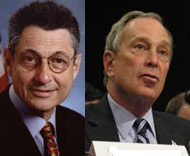4/8/2008
New York State Legislature Spikes Congestion TaxNew York state legislature fails to pass congestion pricing plan in time to collect federal cash.

The New York state legislature has likely put an end to New York City Mayor Michael Bloomberg's long-held dream of taxing motorists for the privilege of entering his city (view plan details). The General Assembly, after days of backdoor negotiations and favor-trading, failed to hold a vote on the legislation required to meet a midnight Monday deadline to keep a $354 million federal grant that served as the catalyst for the taxation plan. Instead of using this money, taken from federal gas tax revenue, for the maintenance and expansion of roads, US Transportation Secretary Mary E. Peters vowed to hold the vast sum out to other cities committed to imposing new taxes on the use of existing roads.
"While today's announcement, if accurate, is deeply disappointing, New York's mounting traffic and environmental woes point to congestion pricing as an inevitable solution, even if not in the next few months or with the assistance of federal Urban Partnership dollars," Peters said. "Starting tomorrow, we will engage with many of the largest cities in the United States that have put forward ambitious traffic fighting plans to discuss how they could use this money to cut traffic, improve transit and reduce pollution."
New York's effort ground to a halt when Assembly Speaker Sheldon Silver (D-New York) counted less than a quarter of his party, which holds the majority, in favor of congestion pricing. The speaker declined to schedule a vote and Senate Majority Leader Joseph L. Bruno (R-Saratoga Springs) failed to rally a quorum of members in his chamber to hold a vote as intended.
The congestion tax plan, based on the model of London, would have charged motorists an initial fee of up to $9 to enter Manhattan during the workday, with delivery trucks facing up to $22 in new fees. Those accused of failing to pay the tax on time would have been hit with a ticket of up to $140. Money raised under the program would have been diverted to the expansion of bus and subway lines.


